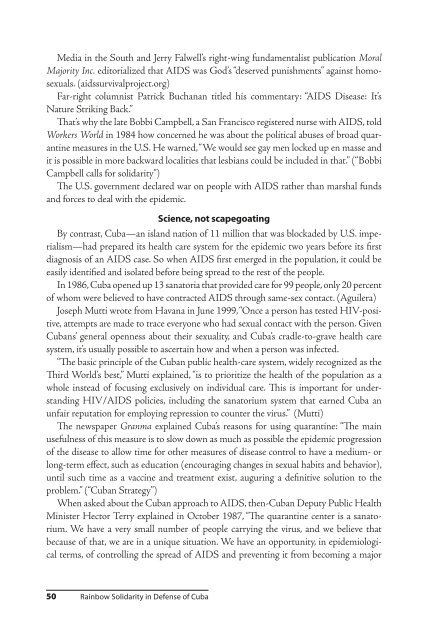LavenderRed_Cubabook
LavenderRed_Cubabook
LavenderRed_Cubabook
Create successful ePaper yourself
Turn your PDF publications into a flip-book with our unique Google optimized e-Paper software.
Media in the South and Jerry Falwell’s right-wing fundamentalist publication Moral<br />
Majority Inc. editorialized that AIDS was God’s “deserved punishments” against homosexuals.<br />
(aidssurvivalproject.org)<br />
Far-right columnist Patrick Buchanan titled his commentary: “AIDS Disease: It’s<br />
Nature Striking Back.”<br />
That’s why the late Bobbi Campbell, a San Francisco registered nurse with AIDS, told<br />
Workers World in 1984 how concerned he was about the political abuses of broad quarantine<br />
measures in the U.S. He warned, “We would see gay men locked up en masse and<br />
it is possible in more backward localities that lesbians could be included in that.” (“Bobbi<br />
Campbell calls for solidarity”)<br />
The U.S. government declared war on people with AIDS rather than marshal funds<br />
and forces to deal with the epidemic.<br />
Science, not scapegoating<br />
By contrast, Cuba—an island nation of 11 million that was blockaded by U.S. imperialism—had<br />
prepared its health care system for the epidemic two years before its first<br />
diagnosis of an AIDS case. So when AIDS first emerged in the population, it could be<br />
easily identified and isolated before being spread to the rest of the people.<br />
In 1986, Cuba opened up 13 sanatoria that provided care for 99 people, only 20 percent<br />
of whom were believed to have contracted AIDS through same-sex contact. (Aguilera)<br />
Joseph Mutti wrote from Havana in June 1999, “Once a person has tested HIV-positive,<br />
attempts are made to trace everyone who had sexual contact with the person. Given<br />
Cubans’ general openness about their sexuality, and Cuba’s cradle-to-grave health care<br />
system, it’s usually possible to ascertain how and when a person was infected.<br />
“The basic principle of the Cuban public health-care system, widely recognized as the<br />
Third World’s best,” Mutti explained, “is to prioritize the health of the population as a<br />
whole instead of focusing exclusively on individual care. This is important for understanding<br />
HIV/AIDS policies, including the sanatorium system that earned Cuba an<br />
unfair reputation for employing repression to counter the virus.” (Mutti)<br />
The newspaper Granma explained Cuba’s reasons for using quarantine: “The main<br />
usefulness of this measure is to slow down as much as possible the epidemic progression<br />
of the disease to allow time for other measures of disease control to have a medium- or<br />
long-term effect, such as education (encouraging changes in sexual habits and behavior),<br />
until such time as a vaccine and treatment exist, auguring a definitive solution to the<br />
problem.” (“Cuban Strategy”)<br />
When asked about the Cuban approach to AIDS, then-Cuban Deputy Public Health<br />
Minister Hector Terry explained in October 1987, “The quarantine center is a sanatorium.<br />
We have a very small number of people carrying the virus, and we believe that<br />
because of that, we are in a unique situation. We have an opportunity, in epidemiological<br />
terms, of controlling the spread of AIDS and preventing it from becoming a major<br />
50 Rainbow Solidarity in Defense of Cuba


